Introduction
Vegan lifestyles are rapidly transforming the way people approach food, health, and sustainability. At its core, veganism avoids all animal-based products, including meat, dairy, eggs, and honey, while emphasizing a diet rich in fruits, vegetables, grains, legumes, nuts, and seeds. Once considered an alternative choice, veganism has now become a mainstream trend, influencing restaurants, grocery stores, and global food industries.
Vegan diets are increasingly popular due to their powerful health benefits. Research shows that adopting a plant-based diet can lower the risk of chronic diseases such as heart disease, diabetes, and obesity, while boosting energy levels, improving digestion, and supporting overall wellness. People are not only motivated by personal health but also by the desire to embrace a sustainable lifestyle that benefits the planet.
Vegan choices also play a crucial role in environmental protection. One of the main causes of water pollution, deforestation, and greenhouse gas emissions is animal husbandry. By choosing Vegen options, individuals reduce their carbon footprint, conserve natural resources, and promote ethical treatment of animals. This combination of personal wellness and environmental responsibility makes veganism a highly impactful and socially conscious lifestyle choice.
In this post, we will explore the rise of Vegetarian diets, their health and environmental advantages, and practical tips for integrating more plant-based meals into your daily routine. We will also address common myths and challenges, offering actionable strategies to make transitioning to a vegan lifestyle easier and more enjoyable. Whether you are considering a complete shift to veganism or simply want to incorporate healthier plant-based meals, this guide provides everything you need to start your journey confidently.
What is Vegan?
Vegan is more than just a diet—it is a lifestyle centered around eliminating all animal products, including meat, dairy, eggs, and honey. People choose a Vegetarian lifestyle for a variety of reasons, ranging from health benefits and ethical concerns to environmental sustainability. While many assume veganism is simply a way to eat plant-based foods, it often extends into choices regarding clothing, cosmetics, and everyday products, reflecting a commitment to reducing animal exploitation in all areas of life.
Vegan vs Vegetarian – Key Differences
| Aspect | Vegan | Vegetarian |
|---|---|---|
| Animal Products | No meat, dairy, eggs, or honey | No meat; may include dairy and eggs |
| Ethical Considerations | Avoids all forms of animal exploitation | Mainly avoids meat |
| Environmental Impact | Lower carbon footprint, conserves resources | Moderate environmental benefit |
| Lifestyle Choices | Includes vegan clothing, cosmetics, and more | Usually limited to diet only |
This table clearly shows that Vegen choices extend beyond food, making it a holistic lifestyle that impacts health, ethics, and the environment.
Types of Vegan Lifestyle
- Dietary Vegetarian– Focuses exclusively on a plant-based diet, removing all animal-derived foods to support health and wellness.
- Ethical Vegan – Avoids all animal products in daily life due to moral concerns for animal welfare and cruelty-free living.
- Environmental Vegetarian – Chooses veganism primarily to reduce environmental impact, including lowering carbon emissions, conserving water, and preventing deforestation.
Common Myths & Facts About Veganism
- Myth: Vegetarian diets lack sufficient protein.
Fact: Plant-based protein sources such as lentils, tofu, beans, quinoa, nuts, and seeds provide ample protein for all ages. - Myth: Vegetarian food is bland or limited.
Fact: A vegan diet offers diverse flavors and nutrient-rich meals, with endless recipe options from around the world. - Myth: Vegenism is expensive.
Fact: Staple Vegetarian foods like grains, beans, seasonal vegetables, and fruits are often more affordable than animal products. - Myth: Vegetarian can’t get enough calcium or iron.
Fact: Plant-based foods, fortified products, and supplements easily provide essential nutrients for optimal health.
Benefits of a Vegan Lifestyle
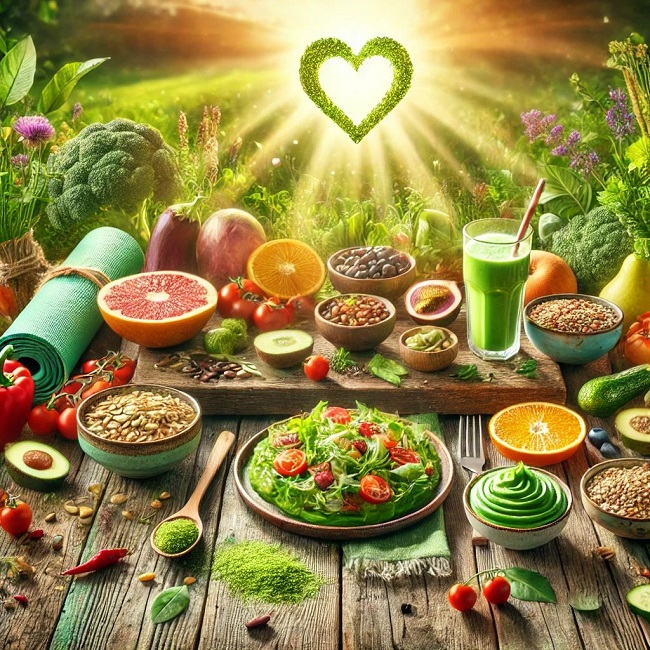
Vegan lifestyles are not just a dietary choice—they represent a holistic approach to health, the environment, and ethical living. Adopting a vegan diet and mindset can improve overall well-being, reduce environmental impact, and support a cruelty-free lifestyle. As more people become conscious of their health, sustainability, and ethical responsibilities, the benefits of a Vegen lifestyle continue to gain global attention.
Health Benefits
A vegan diet is rich in plant-based nutrients, antioxidants, and fiber, offering numerous advantages for long-term health. Key benefits include:
- Heart Health Improvement: Following a Vegetarian diet helps lower cholesterol and blood pressure, reducing the risk of heart disease. Whole grains, legumes, nuts, and leafy greens provide essential nutrients that promote cardiovascular wellness.
- Weight Management: A plant-based lifestyle is naturally lower in calories and saturated fats, making it easier to maintain a healthy weight. High fiber intake from fruits, vegetables, and grains promotes satiety and reduces overeating.
- Diabetes Prevention: Research shows that a Vegetarian diet can significantly reduce the risk of type 2 diabetes by improving insulin sensitivity and regulating blood sugar levels through nutrient-rich, low-glycemic foods.
- Cancer Risk Reduction: Plant-based foods are high in antioxidants and phytochemicals, which help combat oxidative stress and inflammation. A Vegetarian diet emphasizes these nutrient-dense foods, lowering the risk of certain cancers.
Environmental Benefits
Choosing a Vegen lifestyle has a profound impact on the planet:
- Reducing Carbon Footprint: Animal agriculture is a major contributor to greenhouse gas emissions. A Vegetarian diet helps lower individual carbon footprints and combats climate change.
- Reducing Water Waste: Producing plant-based foods consumes far less water compared to animal products, making a Vegen lifestyle a more water-efficient choice.
- Protecting Forests and Natural Resources: Livestock farming drives deforestation and habitat destruction. By following a Vegetarian diet, you help preserve forests, protect biodiversity, and conserve vital natural resources.
Ethical Benefits
Beyond personal and environmental advantages, Vegetarian living promotes a compassionate and sustainable lifestyle:
- Animal Cruelty-Free Life: Veganism avoids animal exploitation in food, clothing, and daily products, promoting a cruelty-free way of living.
- Sustainable and Ethical Living: A Vegen lifestyle encourages responsible consumption, reducing the strain on natural resources and fostering a more ethical and sustainable world.
Vegan Diet Guide for Beginners
Vegetarian diets are rapidly gaining popularity as people discover the health, environmental, and ethical benefits of plant-based living. For beginners, transitioning to a Vegen lifestyle may seem challenging, but with proper guidance and meal planning, it can be both simple and highly rewarding. This guide provides essential nutrients, practical meal planning strategies, and a weekly vegan diet chart to help you get started on a healthy vegan lifestyle.
Essential Nutrients in a Vegan Diet
A balanced Vegetarian diet can provide all the necessary nutrients when planned carefully. Key nutrients to focus on include:
- Protein Sources: Beans, lentils, tofu, tempeh, chickpeas, quinoa, and seitan are rich in protein. These plant-based foods support muscle growth, repair, and overall energy levels while keeping you full longer.
- Calcium & Vitamin D Sources: Fortified plant milks, almond butter, tofu, kale, broccoli, and sun-exposed mushrooms help maintain strong bones and teeth.
- Iron, Omega-3 & Vitamin B12: Spinach, lentils, pumpkin seeds, and fortified cereals provide iron. Omega-3 fatty acids come from chia seeds, flaxseeds, and walnuts, while Vitamin B12 is usually obtained through supplements or fortified foods to ensure optimal energy and nerve function.
Incorporating these nutrients ensures that a Vegen diet is safe, balanced, and highly effective for long-term health.
Meal Planning & Weekly Chart
Proper meal planning is crucial for beginners to maintain a nutrient-rich vegan diet. Planning your meals ensures variety, prevents nutrient deficiencies, and makes sticking to a Vegetarian lifestyle easier.
Breakfast Ideas
- Almond milk, chia seeds, and berries with overnight oats
- Tofu scramble with spinach, mushrooms, and bell peppers
- Green smoothies with kale, banana, plant protein, and almond milk
Lunch & Dinner Plans
- Quinoa salad with roasted vegetables and chickpeas
- Lentil soup paired with whole-grain bread
- Stir-fried tofu or tempeh with brown rice and vegetables
Snacks & Desserts
- Hummus with carrot and cucumber sticks
- Mixed nuts, seeds, and dried fruits
- Vegetarian chocolate avocado mousse or coconut energy balls
🟡 Weekly Vegan Diet Plan
| Day | Breakfast | Lunch | Dinner | Snacks/Dessert |
|---|---|---|---|---|
| Monday | Oatmeal with berries & chia seeds | Quinoa salad with chickpeas | Tofu stir-fry with brown rice | Mixed nuts, fruit |
| Tuesday | Tofu scramble with spinach | Lentil soup with whole-grain bread | Veggie curry with quinoa | Hummus with veggies |
| Wednesday | Green smoothie with almond milk | Chickpea salad wrap | Vegen chili with cornbread | Fruit & seeds |
| Thursday | Avocado toast on whole-grain bread | Buddha bowl with tofu and vegetables | Stir-fried tempeh with broccoli | Vegen yogurt with granola |
| Friday | Chia pudding with fruits | Quinoa & roasted vegetable salad | Eggplant & chickpea stew | Trail mix |
| Saturday | Vegen pancakes with maple syrup | Falafel wrap with tahini sauce | Veggie stir-fry with tofu | Dark chocolate, fruits |
| Sunday | Smoothie bowl with nuts & seeds | Lentil salad with roasted veggies | Vegetarian pasta with tomato sauce | Coconut energy balls |
This weekly plan ensures a balanced intake of proteins, vitamins, minerals, and healthy fats while keeping meals flavorful and easy to prepare.
Popular Vegan Recipes
Vegan recipes are not only nutritious but also flavorful, easy to prepare, and perfect for anyone adopting a plant-based lifestyle. Whether you are a beginner or an experienced cook, incorporating a variety of Vegen meals into your daily routine ensures a balanced diet while keeping meals exciting and satisfying. From breakfast to dinner, including quick snacks and desserts, there is an endless variety of delicious Vegen options to explore.
Easy Vegetarian Breakfast
A wholesome Vegetarian breakfast jumpstarts your day with energy and essential nutrients. Popular plant-based breakfast ideas include:
- Vegan Smoothies: Blend leafy greens, banana, berries, and plant-based protein powder with almond or oat milk for a nutrient-packed start.
- Overnight Oats: Mix oats, chia seeds, plant-based milk, and seasonal fruits for a filling, make-ahead breakfast.
- Vegan Pancakes: Prepare fluffy pancakes using flaxseed or chia eggs and plant-based milk, topped with fresh fruits and natural sweeteners like maple syrup.
These easy Vegen breakfast recipes save time, boost energy, and provide essential vitamins and minerals to fuel your morning.
Vegan Lunch & Dinner Ideas
Lunch and dinner offer opportunities to enjoy hearty, flavorful, and satisfying Vegen meals:
- Vegetarian Pasta: Whole-grain pasta tossed with roasted vegetables, tomato sauce, garlic, and nutritional yeast creates a protein-rich, filling meal.
- Vegetarian Curry: Combine coconut milk, lentils, chickpeas, and seasonal vegetables to make a creamy, nutrient-dense curry perfect for dinner.
- Vegan Burgers: Prepare plant-based burgers from black beans, lentils, or mushrooms, served on whole-grain buns with fresh vegetables and Vegen sauces.
These Vegen lunch and dinner ideas are versatile, packed with protein and fiber, and ideal for meal prep or enjoying freshly cooked meals at home.
Quick Vegan Snacks & Desserts
A Vegetarian lifestyle doesn’t mean giving up tasty snacks and desserts. Quick plant-based options include:
- Energy Bars: Combine oats, nuts, seeds, and dried fruits for homemade bars that are portable, nutritious, and energizing.
- Vegen Ice Cream: Use coconut milk, almond milk, or cashew cream with natural sweeteners to create a creamy, guilt-free dessert.
- Fruit & Nut Mixes: Easy, nutrient-dense snacks that provide fiber, protein, and healthy fats for on-the-go enjoyment.
These quick Vegen snacks and desserts are perfect for satisfying cravings while maintaining a healthy plant-based diet.
5 Easy Vegan Recipes for Beginners
Adopting a Vegetarian lifestyle is easier than ever with simple, delicious recipes that anyone can make at home. These 5 easy vegan recipes cover breakfast, lunch, dinner, and dessert, ensuring a balanced plant-based diet.
1. Vegan Banana Oat Pancakes
Ingredients:
- 1 cup rolled oats
- 1 ripe banana
- 1 cup almond milk (or any plant-based milk)
- 1 tsp baking powder
- 1 tsp vanilla extract
- Pinch of salt
Instructions:
- Blend the oats in a blender until they become fine oat flour.
- Add the banana, almond milk, baking powder, vanilla extract, and salt. Blend until smooth.
- Heat a non-stick pan over medium heat and pour small portions of batter to form pancakes.
- Cook until golden brown, 2 to 3 minutes per side.
- Serve your Vegen pancakes with maple syrup and fresh fruits.
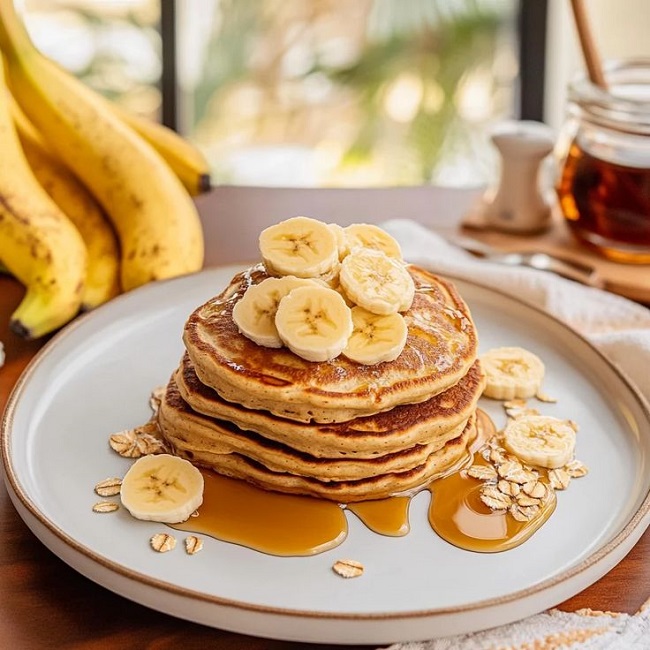
2. Vegan Chickpea Salad Sandwich
Ingredients:
- 1 can chickpeas, drained and rinsed
- 2 tbsp vegan mayonnaise
- 1 tsp mustard
- 1 celery stalk, finely chopped
- Salt & pepper to taste
- Whole-grain bread
Instructions:
- Mash chickpeas in a bowl until slightly chunky.
- Mix in vegan mayo, mustard, chopped celery, salt, and pepper.
- Spread the mixture on whole-grain bread slices.
- Add lettuce, tomato, or avocado if desired.
- Enjoy a hearty, protein-packed Vegen sandwich.
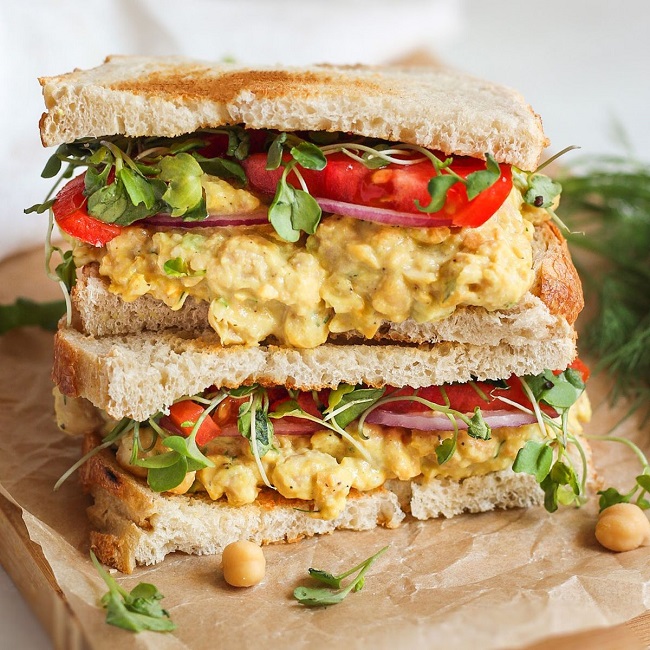
3. Vegan Lentil Curry
Ingredients:
- 1 cup red lentils, rinsed
- 1 onion, chopped
- 2 garlic cloves, minced
- 1 can diced tomatoes
- 1 tsp turmeric, 1 tsp cumin, 1 tsp coriander
- 2 cups vegetable broth
- Salt & pepper to taste
Instructions:
- Sauté onion and garlic in a pan with a little oil until soft.
- Add turmeric, cumin, and coriander and cook for 1 minute.
- Add lentils, diced tomatoes, and vegetable broth.
- Simmer for 20–25 minutes until lentils are tender.
- Serve hot with rice or vegan naan.
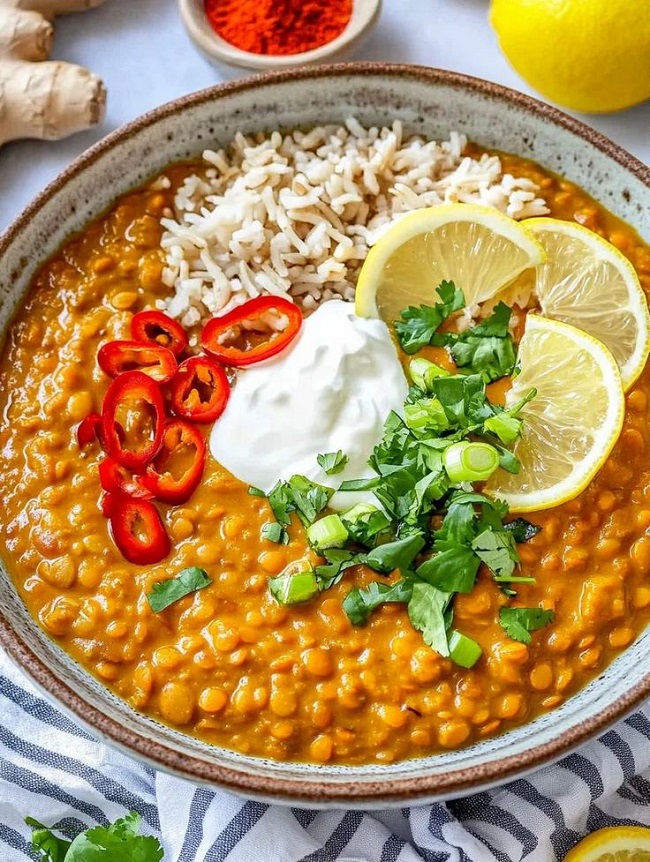
4. Vegan Buddha Bowl
Ingredients:
- 1 cup cooked quinoa
- 1 cup roasted vegetables (carrots, broccoli, bell peppers)
- 1/2 cup chickpeas
- 1 tbsp tahini
- 1 tsp lemon juice
- Salt & pepper to taste
Instructions:
- Place cooked quinoa at the base of a bowl.
- Top with roasted vegetables and chickpeas.
- Drizzle with tahini and lemon juice.
- Season with salt and pepper.
- Mix gently and enjoy a colorful, nutrient-rich Vegen meal.
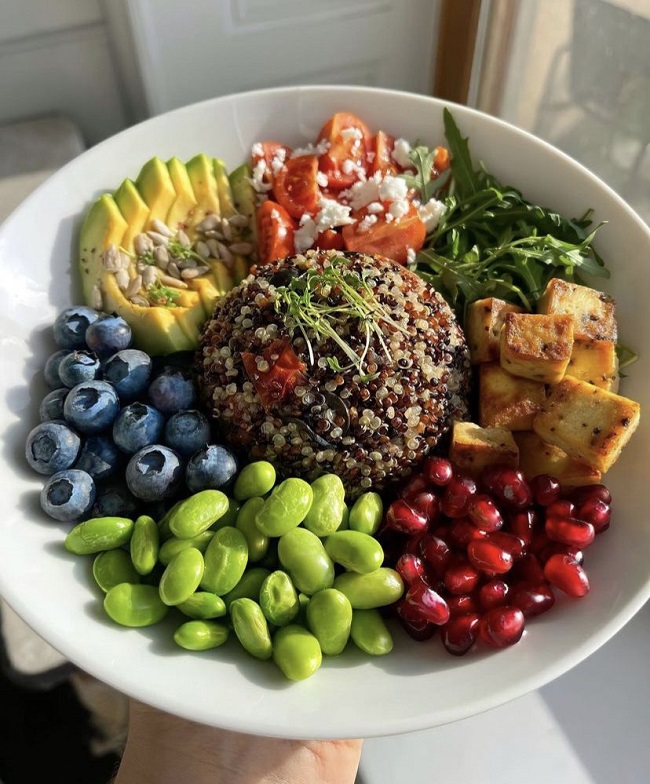
5. Vegan Chocolate Avocado Mousse
Ingredients:
- 2 ripe avocados
- 1/4 cup cocoa powder
- 1/4 cup maple syrup
- 1 tsp vanilla extract
- Pinch of salt
Instructions:
- Blend avocados, cocoa powder, maple syrup, vanilla extract, and salt until smooth and creamy.
- Before serving, let it cool for half an hour in the fridge.
- Garnish with berries or nuts for extra flavor.
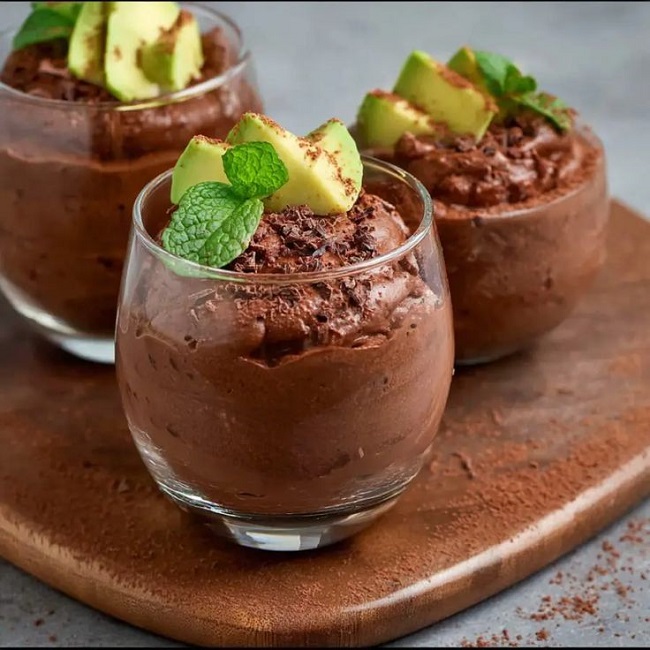
Challenges of Going Vegan & How to Overcome Them
Adopting a vegan lifestyle offers numerous health, environmental, and ethical benefits, but it also comes with challenges that beginners often face. Understanding these potential obstacles and learning how to overcome them ensures a smoother transition to a sustainable plant-based diet.
Nutrient Deficiency Risks
One of the main challenges of a Vegetarian diet is ensuring adequate intake of certain nutrients typically obtained from animal products:
- Vitamin B12: Essential for energy, red blood cell formation, and nervous system health. Vegen should consume B12-fortified foods or take supplements.
- Iron: Plant-based iron sources like lentils, beans, spinach, and tofu are less easily absorbed than animal-based iron. Pairing them with vitamin C-rich foods such as bell peppers, citrus fruits, or tomatoes enhances absorption.
- Calcium & Omega-3: Fortified plant milks, chia seeds, flaxseeds, walnuts, and leafy greens are important for bone health and heart function on a Vegetarian diet.
By incorporating fortified foods, supplements, and a variety of nutrient-dense plant-based options, nutrient deficiencies can be effectively avoided while following a Vegen lifestyle.
Social & Cultural Barriers
Many beginners encounter challenges in social and cultural settings, where traditional meals often feature animal products. This can make eating out or attending family gatherings more difficult.
Solutions:
- Research menus or call restaurants ahead to find Vegetarian-friendly options.
- Communicate your dietary preferences with friends and family to ensure inclusive meals.
- Bring simple Vegen snacks when attending social events or gatherings.
Strategies to Overcome Challenges
Overcoming the common hurdles of veganism involves planning, support, and education:
- Supplements & Fortified Foods: Use B12 supplements, fortified plant milks, and other essential Vegen -friendly nutrients to maintain a balanced diet.
- Community Support: Join Vegen communities, online forums, or local groups to gain encouragement, recipe ideas, and practical tips.
- Meal Planning & Education: Strategically plan meals to cover all essential nutrients and gradually adapt your taste and cooking habits to a Vegetarian lifestyle.
Transitioning to a Vegetarian diet may require adjustment, but with careful planning and support, it becomes a manageable and highly rewarding choice. By addressing nutrient gaps, overcoming social barriers, and seeking community guidance, anyone can thrive on a Vegen lifestyle and enjoy its health, ethical, and environmental benefits.
Vegan Substitutes You Should Try
Adopting a vegan lifestyle doesn’t mean giving up your favorite foods. Thanks to a growing variety of plant-based alternatives, it’s now easier than ever to enjoy creamy, savory, and hearty dishes without animal products. Incorporating these Vegen substitutes into your meals ensures both nutrition and taste while maintaining a cruelty-free diet.
Dairy Alternatives
Replacing dairy is often one of the first steps in transitioning to a Vegetarian diet. Plant-based options are now widely available and versatile:
- Plant-Based Milk: Soy milk, almond milk, oat milk, and coconut milk are excellent alternatives for drinking, cooking, and baking. They are nutrient-rich and available in fortified varieties with calcium and vitamin D.
- Vegan Cheese & Butter: Made from nuts, soy, or coconut oil, Vegetarian cheese and butter replicate the taste and texture of traditional dairy. These are perfect for spreads, sauces, and baked goods.
Using these alternatives allows you to enjoy creamy Vegen lattes, rich desserts, and comfort foods while staying fully plant-based.
Meat Substitutes
Getting enough protein is essential in a vegan lifestyle, and there are numerous flavorful alternatives to meat:
- Tofu: A versatile soy-based product that absorbs flavors well and can be stir-fried, grilled, or baked.
- Seitan: Made from wheat gluten, it has a meaty texture ideal for stir-fries, sandwiches, and Vegen “steak” recipes.
- Jackfruit: With its fibrous texture, jackfruit is perfect for Vegetarian pulled “pork,” tacos, and sandwiches.
These meat substitutes make it easy to create satisfying, protein-rich meals while adhering to a Vegen diet.
Egg Alternatives
Eggs are widely used in cooking and baking, but several plant-based alternatives work perfectly in a vegan diet:
- Flaxseed & Chia Seed: When mixed with water, these seeds form a gel that works well as a binding agent in baked goods.
- Aquafaba: The liquid from canned chickpeas can replace eggs in recipes for meringues, cakes, and mousses, providing structure and fluffiness.
With these egg alternatives, Vegen can enjoy baking, desserts, and savory dishes without compromising texture or flavor.
Vegan Beyond Food – Lifestyle Choices
Adopting a vegan lifestyle goes far beyond what you eat. Many individuals embrace veganism as a holistic approach, making conscious choices in beauty, fashion, and travel. These lifestyle changes not only align with ethical values but also promote sustainability and personal well-being.
Vegan Cosmetics & Skincare
Vegan cosmetics and skincare are completely free from animal-derived ingredients and are never tested on animals. Popular Vegen products include plant-based moisturizers, shampoos, soaps, and cruelty-free makeup. Choosing vegan beauty products supports ethical practices, reduces environmental impact, and ensures you use safe, natural ingredients in your daily routine.
Vegan Clothing & Accessories
Vegan fashion avoids leather, wool, silk, and other animal-derived materials. Instead, it emphasizes plant-based or synthetic alternatives such as organic cotton, hemp, recycled fabrics, and high-quality faux leather. Incorporating Vegen clothing and accessories into your wardrobe allows you to enjoy stylish, durable, and cruelty-free fashion that reflects your ethical values.
Vegan Travel Tips
Traveling as a vegan is easier than ever with careful planning. To maintain a plant-based lifestyle on the go:
- Research Vegen-friendly restaurants and accommodations ahead of time.
- Pack snacks and portable Vegen meals.
- Learn key phrases to request Vegetarian options in local languages.
Many cities and tourist destinations now cater to Vegen travelers, making it simple to explore the world while staying committed to a Vegetarian lifestyle.
Conclusion
Adopting a vegan lifestyle is not just about food—it is a conscious choice that encompasses health, ethics, and sustainability. From nutritious plant-based meals to cruelty-free cosmetics, eco-friendly fashion, and mindful travel, veganism encourages a holistic approach to living that benefits your body, the environment, and animals alike.
A vegan diet offers remarkable health advantages, including improved heart health, better weight management, increased energy, and reduced risk of chronic diseases. Beyond personal wellness, following a Vegen lifestyle helps conserve natural resources, lower your carbon footprint, and promote ethical treatment of animals. By making intentional choices, even small ones, anyone can gradually transition into a sustainable vegan lifestyle.
Starting your Vegetarian journey can be simple. Incorporate more plant-based meals into your daily routine, experiment with Vegen substitutes, and try new vegan recipes regularly. Over time, these small steps accumulate into meaningful lifestyle changes that support both health and the planet.
Ultimately, choosing a Vegen lifestyle is a commitment to a healthier, more ethical, and environmentally responsible future. Every decision—from swapping dairy for plant-based milk to choosing cruelty-free products—contributes to a positive impact. Embracing veganism helps you live in alignment with your values while shaping a sustainable, compassionate, and conscious way of life.
By adopting vegan practices, you become part of a growing global movement that prioritizes health, kindness, and environmental stewardship. The journey begins with simple choices, but the long-term benefits extend far beyond the plate, creating a better future for yourself, the planet, and all living beings.
FAQs
Can someone lose weight by following a vegan diet?
A vegan diet can be highly effective for weight loss when planned carefully. Plant-based meals are generally lower in calories and high in fiber, which helps you feel full for longer periods. Including whole grains, legumes, vegetables, and fruits promotes fat reduction while maintaining energy levels. However, it’s important to avoid heavily processed Vegen snacks and refined carbs, as they can slow down weight loss progress.
Can vegans build muscle without meat?
Yes, vegans can build muscle without consuming meat. Plant-based protein sources like tofu, tempeh, seitan, lentils, chickpeas, quinoa, and nuts provide essential amino acids necessary for muscle growth. By combining different protein sources throughout the day and pairing them with strength training exercises, Vegetarian can effectively develop and maintain muscle mass while enjoying a plant-based diet.
What are the cheapest vegan protein sources?
Some of the most affordable and nutrient-dense vegan protein sources include:
Lentils and beans
Chickpeas and black beans
Tofu and tempeh
Peanut butter and other nut butters
These options are budget-friendly, versatile, and provide not only protein but also fiber, vitamins, and minerals, making them ideal staples for a Vegen diet.
How to start a vegan diet as a beginner?
Starting a vegan diet as a beginner is simple with the right approach:
Gradually replace animal products with plant-based alternatives.
Include a variety of protein, iron, calcium, and vitamin B12 sources in meals.
Explore easy Vegen recipes and convenient snacks.
Join online Vegen communities or local groups for guidance, tips, and support.
Consistency, meal planning, and patience are key for transitioning smoothly to a healthy vegan lifestyle.
Are vegan products always healthy?
Not all vegan products are automatically healthy. Processed vegan foods, such as frozen meals, packaged snacks, or desserts, can contain high amounts of sugar, salt, or refined ingredients. A truly healthy Vegen diet focuses on whole, minimally processed foods—like vegetables, fruits, legumes, whole grains, nuts, and seeds—to provide optimal nutrition and support overall wellness.